Related Research Articles

William Boyd Watterson II is an American cartoonist who authored the comic strip Calvin and Hobbes. The strip was syndicated from 1985 to 1995. Watterson concluded Calvin and Hobbes with a short statement to newspaper editors and his readers that he felt he had achieved all he could in the medium. Watterson is known for his negative views on comic syndication and licensing, his efforts to expand and elevate the newspaper comic as an art form, and his move back into private life after Calvin and Hobbes ended. Watterson was born in Washington, D.C., and grew up in Chagrin Falls, Ohio. The suburban Midwestern United States setting of Ohio was part of the inspiration for the setting of Calvin and Hobbes. Watterson lives in Cleveland Heights, Ohio as of January 2024.

A comic strip is a sequence of cartoons, arranged in interrelated panels to display brief humor or form a narrative, often serialized, with text in balloons and captions. Traditionally, throughout the 20th and into the 21st century, these have been published in newspapers and magazines, with daily horizontal strips printed in black-and-white in newspapers, while Sunday papers offered longer sequences in special color comics sections. With the advent of the internet, online comic strips began to appear as webcomics.

Doonesbury is a comic strip by American cartoonist Garry Trudeau that chronicles the adventures and lives of an array of characters of various ages, professions, and backgrounds, from the President of the United States to the title character, Michael Doonesbury, who has progressed over the decades from a college student to a youthful senior citizen.

The Katzenjammer Kids is an American comic strip created by Rudolph Dirks in 1897 and later drawn by Harold Knerr for 35 years. It debuted on December 12, 1897, in the American Humorist, the Sunday supplement of William Randolph Hearst's New York Journal. The comic strip was turned into a stage play in 1903. It inspired several animated cartoons and was one of 20 strips included in the Comic Strip Classics series of U.S. commemorative postage stamps.

Peanuts is a syndicated daily and Sunday American comic strip written and illustrated by Charles M. Schulz. The strip's original run extended from 1950 to 2000, continuing in reruns afterward. Peanuts is among the most popular and influential in the history of comic strips, with 17,897 strips published in all, making it "arguably the longest story ever told by one human being". At the time of Schulz's death in 2000, Peanuts ran in over 2,600 newspapers, with a readership of roughly 355 million across 75 countries, and had been translated into 21 languages. It helped to cement the four-panel gag strip as the standard in the United States, and together with its merchandise earned Schulz more than $1 billion. It got a movie adaptation in 2015 by Blue Sky Studios.
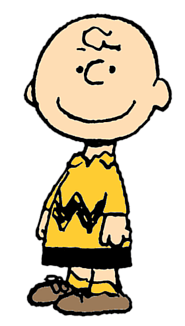
Charles "Charlie" Brown is the principal character of the comic strip Peanuts, syndicated in daily and Sunday newspapers in numerous countries all over the world. Depicted as a "lovable loser", Charlie Brown is one of the great American archetypes and a popular and widely recognized cartoon character. Charlie Brown is characterized as a person who frequently suffers, and as a result, is usually nervous and lacks self-confidence. He shows both pessimistic and optimistic attitudes: on some days, he is apprehensive to even get out of bed because he is unable to face the world, but on others, he hopes for the best and is determined to accomplish things. Charlie Brown is easily recognized by his round head and trademark zigzag patterned shirt. His catchphrase is "Good Grief!"
Marvin, later called Marvin & Family, is a daily newspaper comic strip created by cartoonist Tom Armstrong and distributed in the U.S. by Hearst's King Features Syndicate. Debuting in 1982, it revolves around the life and times of a young baby boy named Marvin, along with his parents, Jeff and Jenny Miller, and their dog Bitsy. In 1989, CBS aired a special, "Marvin, Baby of the Year."
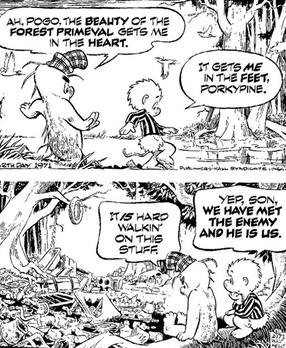
Pogo was a daily comic strip that was created by cartoonist Walt Kelly and syndicated to American newspapers from 1948 until 1975. Set in the Okefenokee Swamp in the Southeastern United States, Pogo followed the adventures of its anthropomorphic animal characters, including the title character, an opossum. The strip was written for both children and adults, with layers of social and political satire targeted to the latter. Pogo was distributed by the Post-Hall Syndicate. The strip earned Kelly a Reuben Award in 1951.

Mutt and Jeff is a long-running and widely popular American newspaper comic strip created by cartoonist Bud Fisher in 1907 about "two mismatched tinhorns". It is commonly regarded as the first daily comic strip. The concept of a newspaper strip featuring recurring characters in multiple panels on a six-day-a-week schedule had previously been pioneered through the short-lived A. Piker Clerk by Clare Briggs, but it was Mutt and Jeff as the first successful daily comic strip that staked out the direction of the future trend.
FoxTrot is an American comic strip written and illustrated by Bill Amend. The strip launched on April 10, 1988, and it originally ran seven days a week. From December 31, 2006 onwards, FoxTrot has only appeared on Sundays.

Life in Hell is a comic strip by Matt Groening that was published weekly from 1977 to 2012. Its main characters include anthropomorphic rabbits and a gay couple. The comic covers a wide range of subjects, such as love, sex, work, and death, and explores themes of angst, social alienation, self-loathing, and fear of inevitable doom. The Simpsons began development as an animated adaptation for a segment of The Tracey Ullman Show, before Groening decided to adapt his character archetypes as original characters to avoid a loss of ownership rights to publish Life in Hell.
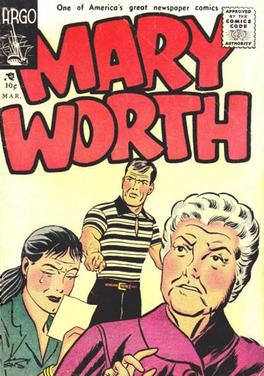
Mary Worth is an American newspaper comic strip that has had an eight-decade run from 1938. Distributed by King Features Syndicate, this soap opera-style strip influenced several that followed. It was created by writer Allen Saunders and artist Dale Connor, and initially appeared under the pseudonym "Dale Allen". Ken Ernst succeeded Connor as artist in 1942.
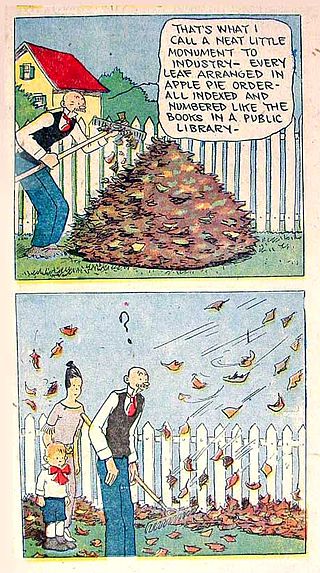
The Gumps is a comic strip about a middle-class family. It was created by Sidney Smith in 1917, launching a 42-year run in newspapers from February 12, 1917, until October 17, 1959.

King Features Syndicate, Inc. is an American content distribution and animation studio, consumer product licensing and print syndication company owned by Hearst Communications that distributes about 150 comic strips, newspaper columns, editorial cartoons, puzzles, and games to nearly 5,000 newspapers worldwide. King Features Syndicate also produces intellectual properties, develops new content and franchises, and licenses its classic characters and properties.

Dalia Messick was an American comic strip artist who used the pseudonym Dale Messick. She was the creator of Brenda Starr, Reporter, which at its peak during the 1950s ran in 250 newspapers.
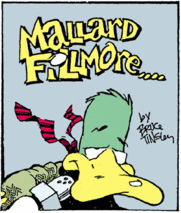
Mallard Fillmore is a comic strip written and illustrated by Bruce Tinsley until 2019 and Loren Fishman since 2020. It has been syndicated by King Features Syndicate since June 6, 1994. The strip follows the exploits of its title character, an anthropomorphic green-plumaged duck who works as a politically conservative reporter at fictional television station WFDR in Washington, D.C. Mallard's name is a pun on the name of the 13th president of the United States, Millard Fillmore.

Between Friends is an internationally syndicated comic strip written by Canadian Sandra Bell-Lundy. The comic strips appear in more than 175 newspapers in ten countries around the world. Three middle-aged professional women and the problems that they face in their lives are the main focus throughout the comic strip series. Initially, Maeve, Susan, and Kimberly were all childless, but Susan and Kimberly are now mothers. Between Friends initially appeared in the St. Catharines Standard in May 1990, and was syndicated by King Features in February 1994.

Creators Syndicate is an American independent distributor of comic strips and syndicated columns to daily newspapers, websites, and other digital outlets. When founded in 1987, Creators Syndicate became one of the few successful independent syndicates founded since the 1930s and was the first syndicate to allow cartoonists ownership rights to their work. Creators Syndicate is based in Hermosa Beach, California.
Bobby Thatcher was an American newspaper adventure comic strip created by the cartoonist George Storm. Storm launched Bobby Thatcher March 21, 1927, for the McClure Syndicate. The series ran until October 16, 1937.
Jeffrey Allen Shesol is an American historian, speechwriter, and comic strip author. He served as a speechwriter for President Bill Clinton and is now a partner at West Wing Writers, a speechwriting and strategy firm in Washington, D.C.
References
- ↑ Shesol, Jeff (April 1991). Thatch featuring Politically Correct Person . Vintage Books. pp. 11. ISBN 0-679-73610-7.
- ↑ "Cartoon News and Views " Archived 2006-12-06 at the Wayback Machine , Comic Artists Professional Society, April 1998.